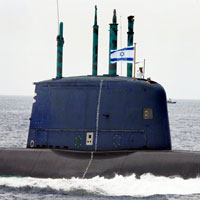
AFP
Israeli U-boat
The Samson Option
Edited by Andy Ross
Israeli Dolphin-class submarines, made in Germany, contain nuclear warheads.
Israel has a maritime nuclear capability, and Israeli politicians and
military officials are praising German-Israeli military cooperation:
"Germany is helping to defend Israel's security. The Germans can be proud of
the fact that they have secured the existence of the state of Israel for
many years to come."
Unlike any other submarine in the Western world,
the Dolphin-class subs have not only torpedo tubes 533 mm in diameter but
also four additional tubes 650 mm in diameter. Israeli arms company Rafael
developed Popeye Turbo cruise missiles for submarine deployment. They are
said to have a range of 1500 km and carry a 200 kg warhead from the
undisclosed Israeli nuclear arsenal.
The Israeli U-boat deterrent is
proof that Israel could respond to a nuclear attack with equally devastating
firepower. For the tiny state of Israel, which could be wiped out with a
nuclear strike, safeguarding this second-strike capability is vital. Defense
Minister Ehud Barak says the submarines are the military response to the
threat in a region "where there is no mercy for the weak." They are Israel's
insurance against the fear that "the Arabs could slaughter us tomorrow," as
David Ben-Gurion, the founder of the State of Israel, once said.
The
German government has always pursued an unwritten rule on its Israel policy.
Former Chancellor Gerhard Schröder summarized it in 2002: "I want to be very
clear: Israel receives what it needs to maintain its security." Arms
shipments began by 1958. The equipment included helicopters, transport
aircraft, tanks, guns, and missiles. In 1967, Israel preempted an attack by
its neighbors and achieved a brilliant victory in the Six-Day War. From then
on, Israeli politician Shimon Peres consistently reminded his colleagues not
to forget "what helped us achieve that victory."
In the 1960s, Peres
took responsibility for Operation Samson. The goal of the operation was to
build an atomic bomb. The Israelis told their allies that they needed cheap
nuclear energy for seawater desalination, and that they planned to use the
water to make the Negev Desert fertile. Israel was short of money, so
Ben-Gurion negotiated in secret with Adenauer over a loan worth billions.
Ben-Gurion said the loan was for an infrastructure project in the Negev
Desert. There was also talk of a desalination plant.
But a
desalination plant operated with nuclear power was never built. Israeli
historian Avner Cohen: "Everything seems to suggest that the Israeli bomb
was financed also with German money." The Israeli government dismissed
questions about its nuclear arsenal with a standard response that stems from
Peres: "We will not introduce nuclear weapons to the region, and certainly
we will not be the first."
Chancellors Willy Brandt and Helmut
Schmidt approved Israeli plans to buy German U-boats. In 1977, the last of
the first three submarines arrived in Haifa. At the time, nobody was
thinking about nuclear second-strike capability. But a few years later a
discussion began about modernizing the Israeli navy to pursue the nuclear
option. Weeks after the fall of the Berlin Wall in 1989, the German
government quietly approved the construction of two Dolphin-class submarines
for Israel, with an option for a third.
During the 1991 Gulf War, the
German government agreed on a huge arms deal for Israel that included
financing for two submarines. In 1994, Chancellor Helmut Kohl and Israeli
Prime Minister Yitzhak Rabin discussed the Mideast and Rabin asked Kohl for
a third submarine. Kohl agreed and the contract for the third submarine was
signed a few months later.
Israeli Popeye Turbo cruise missiles are
easy to mount in the Dolphins. German U-boat manufacturer HDW equipped the
Israeli submarines with a special hydraulic ejection system instead of a
compressed air ejection system to push the missiles out of their outsize
tubes. The Germans prefer not to know: "In politics there are questions that
it's better not to ask, because the answer would be a problem."
Israel has considered using the Samson option at least twice in the past. In
1973, following the Egyptian and Syrian surprise attack during Yom Kippur,
Prime Minister Golda Meir had several nuclear bombs delivered to air force
units on instant readiness. Then Israeli forces rallied and the bombs went
back to their bunkers. And in 1991, at the start of the Gulf War, Iraqi Scud
missiles bombarded Israel and Prime Minister Yitzhak Shamir responded by
mobilizing its nuclear force.
On his last working day in office in
2005, Chancellor Gerhard Schröder approved the delivery of submarines number
4 and 5. When the German Finance Ministry reported on their financing in
2006, ministry officials said the subs were "not suitable for the use of
missiles equipped with nuclear warheads."
Chancellor Angela Merkel is
happy to support Israel. Violating German arms export guidelines, she made a
deal for the delivery of submarine number 6. The contract was signed in
March 2012. Germany gave a discount of €135 million, a third of the cost,
and let Israel defer payment on the rest until 2015. These latest subs
feature fuel cell propulsion that lets them run silently and submerged for
many days, much longer than the previous Dolphins. So Iranian bunkers are
now in range for Israeli nukes, thanks to German engineering.
AR This is a fine example of defense and business solidarity in action.
